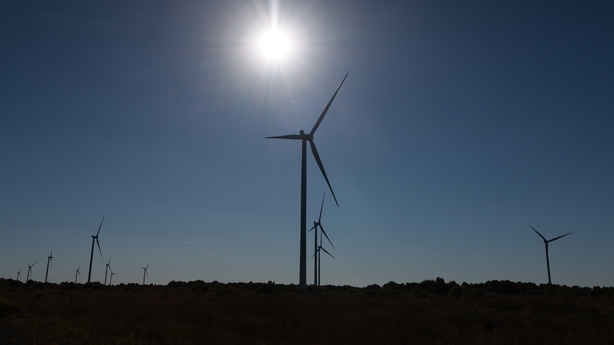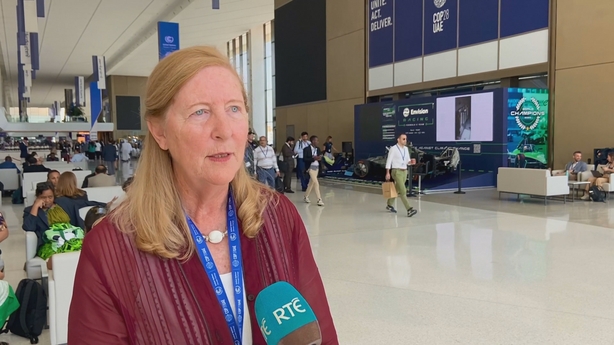The Chair of the Climate Change Advisory Council has said that Ireland effectively lost a "whole year" in relation to the roll-out of sustainable electricity development last year, as there was no planning approval given for wind farms last year before September.
Marie Donnelly was speaking as the council published what was the first ever statutory sectoral review of Ireland's electricity sector.
It has said planning delays and appeals are significantly hindering transformation in the electricity sector, and that much more urgent Government action is required for the electricity sector to meet its climate targets.
Only 0.2 gigawatts of onshore wind capacity was added last year - far short of what is required to meet Ireland's climate targets.
We need your consent to load this rte-player contentWe use rte-player to manage extra content that can set cookies on your device and collect data about your activity. Please review their details and accept them to load the content.Manage Preferences
No new onshore wind projects were approved for an entire year before last September.
Ms Donnelly has called on the Government to show leadership and to take the actions necessary to grasp the known opportunities in the sector.
Minister for the Environment, Climate and Communications, and Transport Eamon Ryan, said An Bord Pleanála did not have sufficient resources and that hindered the progress of sustainable electricity.
"I agree with what the climate change advisory council says our planning and legal system brings real uncertainty and cost and delay, and we do, have to improve that," he said.
"Following a year or two when there weren't any applications being approved or even turned down or considered in any effective way, we are starting to see them come through."
Mr Ryan said nearly all wind projects so far have been further judicially reviewed, which causes huge difficulties in relation to cost and time.
Speaking on RTÉ’s News at One, he said the Government has responded by not just further resourcing An Bord Pleanála, but by adding judges through the creation of the new environmental section of the High Court.
"I think our key to success in terms of delivering the scale of renewables we can and must develop is to make sure we have the resources, so we have speedy legal decisions, so projects aren’t costing us more because of that very lengthy delay."
The report also highlighted how the emissions data for electricity in Ireland flatters to deceive.
The official data for instance shows a 21% reduction in greenhouse gas emissions from the country's electricity sector last year, down to the lowest level since 1990.
One of the main reasons for that, however, was a 12-fold increase in the amount of electricity imported from the UK.

Just over 10% of Ireland’s electricity came from the UK last year, yet none of the associated emissions were allocated to Ireland.
The report says electricity imports from the UK will have to be maintained into the future to keep reported emissions down.
Ireland’s electricity demand increased by 3% last year compared to a reduction of 3.4% in the rest of Europe.
The carbon intensity of electricity generated here is actually 20% above the EU average according to today’s report.
Speaking on RTÉ’s Morning Ireland, Ms Donnelly said last year around 41% of Ireland’s energy needs were met by renewables.
She said the planning process "has been problematic" and even when planning is approved, it is often held up with judicial review or has been challenged.
"This is a concern that we have because if we're going to stay within our carbon budget and meet our targets for 2030, we need to roll out and connect 1.6 gigawatts of renewable electricity every year, last year it was .6, so we have a real gap here and it's very urgent that we move fast in this area."
She said that the Government needed to inform the public about the necessity of providing energy through alternative sources as the country needs it to keep the lights on.
"The focus of the council at the moment is to keep Ireland within its carbon budgets, and that means we need to use the resources that we have available to us today - onshore wind and onshore solar are technologies that we know how to do, and we can roll them out immediately.
"Offshore wind is also important, but it will take longer. So, we can't stop our activities onshore now waiting for offshore, we need the onshore to come on stream."

The Climate Change Advisory Council says the Government must move faster. It wants to see the revised EU Renewable Energy Directive transposed into Irish law as soon as possible to allow "Renewable Accelerated Areas" to be designated.
This would enable shortened and simplified planning procedures to apply for onshore windfarms and, under specific circumstances, remove some of the constraints of the EU Habitat’s Directive.
It also called on the Government to urgently deliver the National Planning Framework Review so that Local Development Plans, County Development Plans and local authority climate action plans can be aligned with the mandated national and regional targets and with EU legal requirements.
Ms Donnelly said the council’s analysis of the electricity sector was a stark reminder of the critical actions that are required to ensure that Ireland stays within its emissions ceiling while providing security of supply for a growing economy.
"Government must show leadership and take the actions required to ensure that Ireland can quickly capitalise on resources that we know are available but cannot come online due to system blockages. We know the potential – we now must have it realised.
"It is important that planning processes are put in place to ensure that new energy infrastructure is developed to withstand future projected climate impacts. Operators must address known flood risks to vital infrastructure and take account of protecting and, where possible enhancing, biodiversity in their developments.
"Building consumer confidence and understanding in electrification is also an important step. If Ireland is to grasp the opportunity in the electricity sector, then it is crucial that we bring consumers and communities with us."
The council has said it is crucial that the use of coal to generate electricity is stopped by 2025 and that the use of oil is phased out as soon as possible.
Speaking in Cork, Tánaiste Micheál Martin said the Government takes on board the criticism but is working through the new legislation which is currently in the Dáil.
"Some people are saying we are going too fast, even though it is two or three years in the making in terms of the formulation of the legislation."







